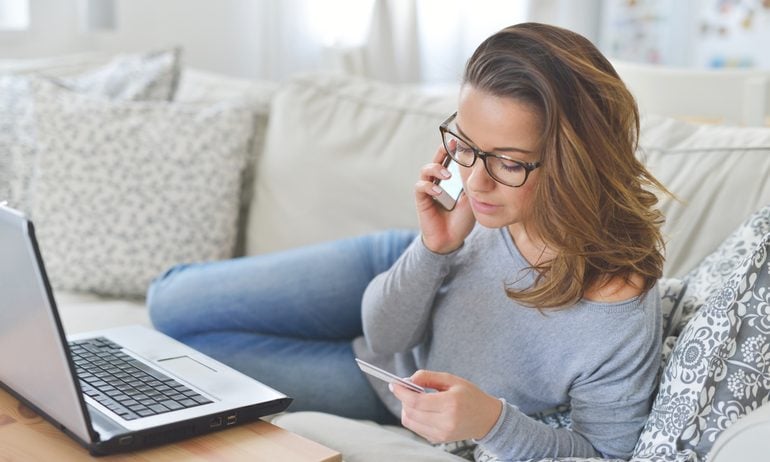Is It Safe to Pay Over the Phone With a Credit Card?
Over-the-phone payments can be more prone to fraud than those made in person or online, but there are steps you can take to protect yourself.

Many or all of the products on this page are from partners who compensate us when you click to or take an action on their website, but this does not influence our evaluations or ratings. Our opinions are our own.
Mobile and online credit card transactions have made over-the-phone payments somewhat rare. Still, there are instances where it might make sense for you to pay this way — when ordering takeout, for example, or paying a bill from a small-business owner.
But the level of risk with over-the-phone payments can be somewhat higher than when using your credit card online or in person, as remote transactions can make it difficult to verify a merchant’s identity.
Here's what to know to limit your susceptibility to fraud when making payments this way.
» MORE: How to prevent credit card fraud
What are the risks of over-the-phone credit card transactions?
Any credit card transaction is potentially vulnerable to fraud. But unlike payments made in person or even online, cardholders and vendors alike aren't necessarily able to verify whether the person at the other end of the line is, in fact, who they say they are.
When you make a transaction by phone, you're typically required to provide the vendor with sensitive information because your card can’t be swiped:
Your name as it appears on the card.
Your card number.
The expiration date.
The card's security code, or CVV.
Sometimes your billing ZIP code.
With remote transactions, it can be difficult to confirm that you're giving out such sensitive information to the intended merchant and not to a fraudster. And protections that could otherwise lessen this risk won't be of much use in an over-the-phone transaction.
A signature, photograph or encrypted card chip, for example, can't be physically verified in these types of scenarios. Even the CVV, or "card verification value," won't be a fail-safe.
Know your protections
If you find yourself a victim of fraud — whether from a transaction over the phone, in person or online — know that you're better protected when you use a credit card than you would be with a debit card.
That's because federal law limits consumers’ liability for credit card fraud to a maximum of $50, and most credit card issuers have $0 liability policies. So while the credit card issuer and/or the merchant may take a loss, it’s unlikely you'll be out any actual money, as you could be if your debit card were compromised.
But reporting the fraud to your issuer, freezing an existing card, ordering a new one and then changing all of your autopay accounts to an updated card number? Those are headaches you can do without. And there are ways to avoid them.
What you can do to protect yourself
There are steps you can take to mitigate the risks of fraud from over-the-phone credit card transactions.
You call them, not the other way around. Never provide your credit card information to representatives who call you unexpectedly. Criminals can claim to be from your card issuer or bank and ask for your personal information. To this end, provide necessary card information only to merchants you've called directly. And before making any transactions, confirm that you've dialed the vendor’s correct phone number.
Double-check the charge before hanging up. When making purchases over the phone, you can't physically see the products you're buying. So after you’ve placed your order, ask the merchant to confirm what you’re being charged for and the exact amount of the transaction. You can also ask for an order confirmation number.
Monitor your account. Review your credit card statement often to check for any fraudulent or suspicious activity and to make sure your transactions are being charged correctly. You might even want to log in to your card account immediately after placing an order to ensure the correct charge appears as "pending."
Use your card's prevention tools. Take advantage of your card's additional security settings. Features like virtual card numbers and account alerts can help ward off fraud, and card lock can help if you find you've been victimized.
Find the right credit card for you.
Whether you want to pay less interest or earn more rewards, the right card's out there. Just answer a few questions and we'll narrow the search for you.



